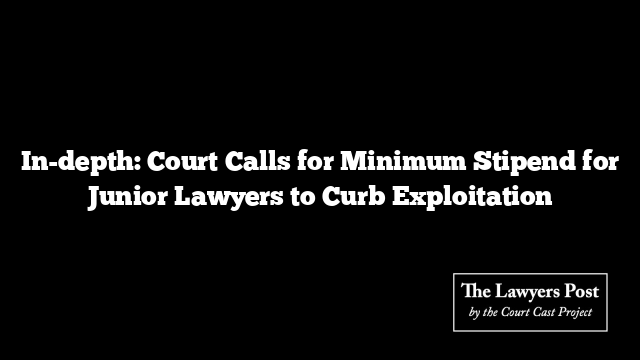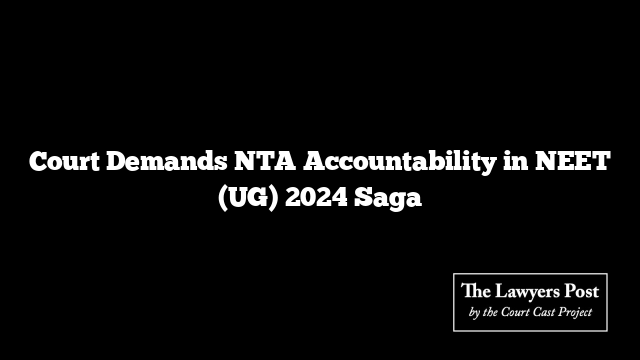The legal profession, often romanticized for its rigor and prestige, harbors a less-discussed reality: the exploitation of junior lawyers. This issue came to the forefront with the Madras High Court’s recent ruling in the case of Farida Begam v. The Puducherry Government, dated June 3, 2024. The Court’s directive, emphasizing the need for a minimum stipend for junior lawyers, marks a significant step towards addressing the systemic exploitation in the legal profession. This article delves into the judgment, explores broader trends and developments across India, and outlines proactive measures junior lawyers can take to safeguard their interests before engagement.
The case of Farida Begam v. The Puducherry Government involved a writ of mandamus seeking the implementation of the Advocates’ Welfare Fund Act, 2001, in Puducherry, and compensation for the delay. The Court highlighted that the benefits provided under the Welfare Fund Act should extend to lawyers practicing in Puducherry, ensuring parity with their counterparts in Tamil Nadu.
One of the most critical aspects of the ruling was the emphasis on the exploitation of junior lawyers. The Court noted that many young lawyers, despite being enrolled with the Bar Council of Tamil Nadu and Puducherry, often work without receiving fair compensation. This practice undermines their professional growth and violates their fundamental rights to livelihood as enshrined in the Constitution of India. Justice S.M. Subramaniam underscored that extracting work without appropriate payment constitutes exploitation and directed the Bar Council to establish guidelines ensuring that senior lawyers pay a minimum stipend to junior lawyers.
Broader Context and Developments
The issue of stipends and fair treatment for junior lawyers is not unique to Tamil Nadu and Puducherry. Several other jurisdictions in India have been grappling with similar concerns, and courts have issued various directives aimed at improving the working conditions for junior lawyers.
- Punjab and Haryana High Court: In early 2024, the Punjab and Haryana High Court issued notices to the Bar Council of India and the state Bar Council, urging them to provide stipends to junior lawyers. The Court referenced a scheme by the Kerala Government, which provides a stipend of Rs. 3,000 to young lawyers with less than three years of practice and an annual income below Rs. 1 lakh (SCC Online).
- Kerala: Kerala has been at the forefront with its Advocates’ Stipend Rules, 2021, which provide up to Rs. 5,000 per month to junior lawyers. This scheme requires junior lawyers to be in regular practice and not engaged in any other substantial profession or business. They must also commit to practicing law for at least ten years (Legal Hub).
- Bombay High Court: In 2022, the Bombay High Court issued a notice to the Bar Council of Maharashtra and Goa, seeking responses on providing stipends to junior lawyers. This initiative aimed to address the financial struggles faced by young advocates in their initial years of practice (Law Trend).
Implications of the Judgment
The Madras High Court’s ruling is expected to have far-reaching implications for the legal profession:
- Financial Stability: Ensuring a minimum stipend will provide financial stability to junior lawyers, allowing them to focus on gaining experience and developing their practice without the pressure of financial insecurity.
- Equity in the Profession: By addressing the disparity in remuneration, the ruling aims to create a more equitable environment for young lawyers, ensuring that they are fairly compensated for their work.
- Precedent for Other Jurisdictions: This decision sets a precedent that could influence other states and Union Territories to adopt similar measures, promoting uniformity in the treatment of junior lawyers across India.
Proactive Measures for Junior Lawyers
While judicial directives and legislative measures are crucial, junior lawyers can take several proactive steps to protect themselves from exploitation:
1. Engagement Letters
One of the most effective tools for junior lawyers is the use of clear and detailed engagement letters. These letters should outline the scope of work, terms of payment, and duration of the engagement. This helps in setting clear expectations and prevents misunderstandings about responsibilities and compensation. By clearly defining the terms of engagement, junior lawyers can safeguard against being overburdened with tasks outside their agreed scope of work (Home).
2. Mentorship
Establishing a mentoring relationship with a senior lawyer can provide junior lawyers with valuable guidance and support. Mentors can help navigate the complexities of legal practice, offer career advice, and provide networking opportunities. A good mentor can help junior lawyers understand the unwritten rules of the profession and avoid pitfalls that could lead to exploitation (Legal Business Online).
3. Negotiating Terms
Junior lawyers should not shy away from negotiating their terms of engagement, including stipends, working hours, and workload expectations. Clear communication about these terms before starting can prevent future disputes and ensure fair treatment. It is important for junior lawyers to assert their rights and make informed decisions about their engagements(Law Gazette) (Home).
4. Professional Networks
Joining professional networks such as local junior lawyers’ divisions and the Junior Solicitors Network can provide support and resources. These networks often offer workshops, seminars, and forums where junior lawyers can learn from their peers and more experienced practitioners. Being part of such networks can also provide a platform to raise concerns and seek collective action against unfair practices (Home).
5. Well-Defined Roles
Clearly defining roles and responsibilities can help junior lawyers avoid being overburdened with tasks that are outside their scope of work. It is essential to ensure that their contributions are recognized and that they are not just seen as a source of cheap labor for menial tasks. By setting clear boundaries and expectations, junior lawyers can protect their professional dignity and ensure meaningful work experiences (Home) (Legal Business Online).
6. Work-Life Balance
Advocating for a healthy work-life balance is crucial. Junior lawyers should be aware of their rights to reasonable working hours and breaks. Firms are increasingly recognizing the importance of mental health and well-being, and junior lawyers should seek environments that prioritize these values. Maintaining a balance between work and personal life is essential for long-term career sustainability (Law Gazette).
7. Professional Development
Continuous professional development through courses and certifications can enhance a junior lawyer’s skills and marketability. This can also provide leverage when negotiating terms of engagement. Investing in professional growth can help junior lawyers build a strong foundation for their careers and open up new opportunities (Home).
8. Legal Advice and Support
Seeking advice from legal bodies like the Bar Council can provide junior lawyers with information about their rights and the support available to them. This can be particularly useful in understanding the legal framework surrounding their employment and any protective measures they can invoke. Staying informed about their rights can empower junior lawyers to stand up against unfair treatment (Home).
The Madras High Court’s directive to ensure a minimum stipend for junior lawyers is a crucial step towards addressing the exploitation faced by young advocates. By mandating fair remuneration, the ruling seeks to protect the livelihood and rights of junior lawyers, fostering a more just and supportive legal community. However, it is equally important for junior lawyers to take proactive measures to protect themselves from exploitation. Through the use of engagement letters, seeking mentorship, negotiating terms, joining professional networks, advocating for work-life balance, investing in professional development, and seeking legal advice, junior lawyers can create a safer and more equitable working environment for themselves. Together, these judicial and proactive measures can pave the way for a more inclusive and supportive legal profession in India.





